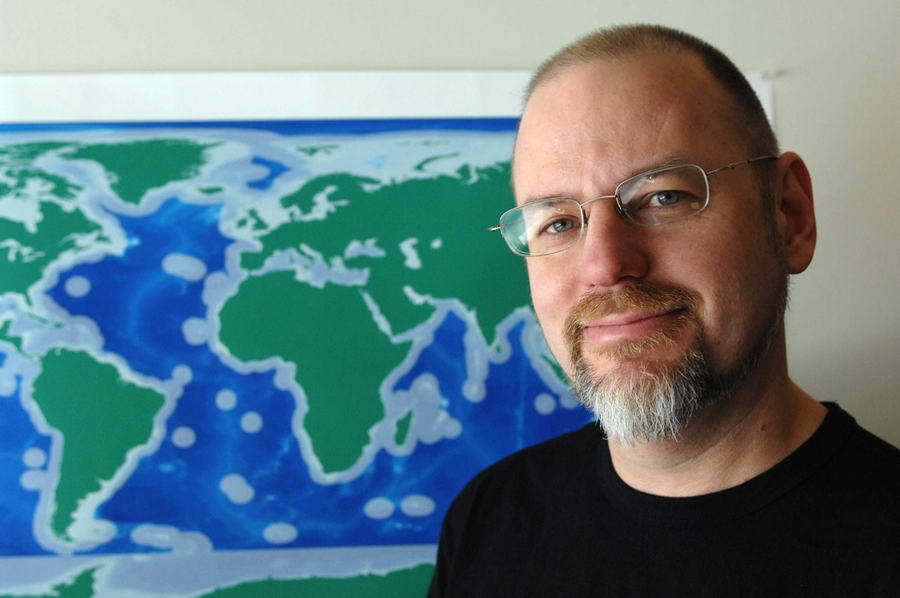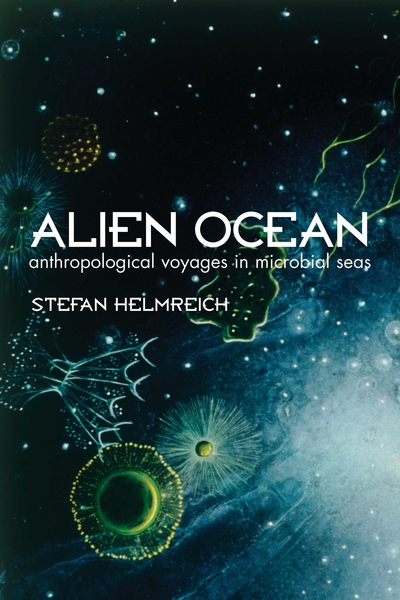When MIT Professor of Anthropology Stefan Helmreich set out to examine the world of marine microbiologists for a new book, his research took an unexpected twist.
Helmreich, who has been recognized for his innovative cultural anthropology work, had decided to study scientists who chase some of the world's smallest creatures in some of the world's most forbidding places. So he spent long hours interviewing microbial biologists such as Penny Chisholm, the Lee and Geraldine Martin Professor of Environmental Studies at MIT, and Edward DeLong, professor in MIT's Department of Biological Engineering and the Department of Civil and Environmental Engineering and an associate member at the Broad Institute.
Anthropologist Stefan Helmreich discusses his research.
He wanted to understand not only how they went about their research, but also what sentiments and belief systems guided them as they scrutinized microbes like Prochlorococcus, a sea-dwelling microbe of global importance that Chisholm co-discovered in 1986.
But during the years of Helmreich's research, the entire field shifted gears. By the time he finished his book, "Alien Ocean: Anthropological Voyages in Microbial Seas," published in early 2009 by University of California Press, marine microbiologists were calling their discipline "microbial oceanography" --Â a reflection that they were not just studying individual single-celled creatures in the ocean, but the ocean itself.
Microbiologists now saw the sea as a microbial soup, a relic of what was on the Earth billions of years ago, filled with life forms both alien and familiar to humans; such perceptions changed the way scientists approached research, he says.
As Helmreich puts it: "Microbes are not only in the sea, they ARE the sea.
'Something of massive consequence'
With frequent references to classical literature and pop culture, "Alien Ocean" explores how microbiologists are re-imagining the sea through the language and techniques of genomics, bioinformatics, biotechnology, biodiversity mapping and systems modeling. The book "is not just about microbiologists sitting around on boats getting seasick looking at very tiny things," he says. "We're looking at something of massive consequence here."
Helmreich has long been interested in exploring other worlds; his 1998 book, "Silicon Second Nature: Culturing Artificial Life in a Digital World," examined virtual life. He became intrigued with marine microbiology in 1998 while attending a conference in Monterey; his interest began to jell into a book project about 2003. Rather than write a kind of "Our Oceans, Ourselves" manifesto, he deliberately employed the figure of the "alien" in the title and throughout the text to describe the unexpected world of these weird little creatures, many of which were new to science.
Chisholm welcomed Helmreich's focus. "Most people don't even know the oceans are microbial-dominated. And they certainly have no idea that there is so much microbial diversity out there, nor do they know about ocean genomics," she says. "We now think of the oceans as a 'Sea of Genes.' I call it 'dissolved information.' I remember being pleased that he was drawn to this concept. It was validating, as I was never quite sure that it was a compelling image."
To get inside the microbiologists' minds, Helmreich traveled to the Sargasso Sea, where he helped graduate students collect water samples for Chisholm's lab. He rode boats with DeLong's postdoctoral associates in Monterey Bay to dredge the sea floor and find "the message in the mud." He examined invasive algae in Waikiki, Hawaii, and explored the sea floor around hydrothermal vents in the Juan de Fuca Ridge in the Pacific. He spent hours querying researchers about their perceptions of microbes, as "extremophiles," "little living machines" or "tape recorders of their environment."
Researching the researchers
"I'm trained in anthropology so I'm interested in what people do, why they think they do it, and what it might mean in broader social frameworks -- politically, economically, socially, morally, ethically, spiritually," Helmreich says. "The question I wanted to answer was this: How is it that people working in the field of microbial ocean biology come to see their work as meaningful both to them and to the rest of us?"
He learned, for example, that Chisholm saw ocean phytoplankton as a kind of forest that could, in time-lapse photography, be seen to breathe. "I believe the earth is a living entity," she told him. He saw DeLong as claiming that, "the entwined orders of nature and society cannot exist without microbes" and that "microbes are mostly allies to be understood rather than enemies to be defeated."
DeLong said his post-doc students, whom Helmreich pressed to explain their work, benefited by being questioned about their underlying beliefs about science. "Sometimes we're so swept up in the details, that we don't see the forest for the trees," DeLong says. "Often times we take a lot for granted. We consider many points of view and facts as being given, but they aren't -- they're built on presumptions."
Science, Helmreich concludes, cannot be divorced from culture. Medieval Christians saw the ocean as frightening chaos; 19th Century Romantics saw it as a symbol of the sublime, both beautiful and terrifying. In the 20th Century, filmmakers like Jacques-Yves Cousteau made the underwater world seem downright friendly. Today, we speak of saving the ocean from overfishing, pollution, and global warming. And, he says, we do not know whether the future sea will be friend or foe; much depends on what we humans do.
"The very fact of caring about the ocean changes the kinds of questions we ask and the kind of things that we take to be facts worth finding out,'' Helmreich says.
Helmreich, who has been recognized for his innovative cultural anthropology work, had decided to study scientists who chase some of the world's smallest creatures in some of the world's most forbidding places. So he spent long hours interviewing microbial biologists such as Penny Chisholm, the Lee and Geraldine Martin Professor of Environmental Studies at MIT, and Edward DeLong, professor in MIT's Department of Biological Engineering and the Department of Civil and Environmental Engineering and an associate member at the Broad Institute.
Anthropologist Stefan Helmreich discusses his research.
He wanted to understand not only how they went about their research, but also what sentiments and belief systems guided them as they scrutinized microbes like Prochlorococcus, a sea-dwelling microbe of global importance that Chisholm co-discovered in 1986.
But during the years of Helmreich's research, the entire field shifted gears. By the time he finished his book, "Alien Ocean: Anthropological Voyages in Microbial Seas," published in early 2009 by University of California Press, marine microbiologists were calling their discipline "microbial oceanography" --Â a reflection that they were not just studying individual single-celled creatures in the ocean, but the ocean itself.
Microbiologists now saw the sea as a microbial soup, a relic of what was on the Earth billions of years ago, filled with life forms both alien and familiar to humans; such perceptions changed the way scientists approached research, he says.
As Helmreich puts it: "Microbes are not only in the sea, they ARE the sea.
'Something of massive consequence'
With frequent references to classical literature and pop culture, "Alien Ocean" explores how microbiologists are re-imagining the sea through the language and techniques of genomics, bioinformatics, biotechnology, biodiversity mapping and systems modeling. The book "is not just about microbiologists sitting around on boats getting seasick looking at very tiny things," he says. "We're looking at something of massive consequence here."
Helmreich has long been interested in exploring other worlds; his 1998 book, "Silicon Second Nature: Culturing Artificial Life in a Digital World," examined virtual life. He became intrigued with marine microbiology in 1998 while attending a conference in Monterey; his interest began to jell into a book project about 2003. Rather than write a kind of "Our Oceans, Ourselves" manifesto, he deliberately employed the figure of the "alien" in the title and throughout the text to describe the unexpected world of these weird little creatures, many of which were new to science.
Chisholm welcomed Helmreich's focus. "Most people don't even know the oceans are microbial-dominated. And they certainly have no idea that there is so much microbial diversity out there, nor do they know about ocean genomics," she says. "We now think of the oceans as a 'Sea of Genes.' I call it 'dissolved information.' I remember being pleased that he was drawn to this concept. It was validating, as I was never quite sure that it was a compelling image."
To get inside the microbiologists' minds, Helmreich traveled to the Sargasso Sea, where he helped graduate students collect water samples for Chisholm's lab. He rode boats with DeLong's postdoctoral associates in Monterey Bay to dredge the sea floor and find "the message in the mud." He examined invasive algae in Waikiki, Hawaii, and explored the sea floor around hydrothermal vents in the Juan de Fuca Ridge in the Pacific. He spent hours querying researchers about their perceptions of microbes, as "extremophiles," "little living machines" or "tape recorders of their environment."
Researching the researchers
"I'm trained in anthropology so I'm interested in what people do, why they think they do it, and what it might mean in broader social frameworks -- politically, economically, socially, morally, ethically, spiritually," Helmreich says. "The question I wanted to answer was this: How is it that people working in the field of microbial ocean biology come to see their work as meaningful both to them and to the rest of us?"
He learned, for example, that Chisholm saw ocean phytoplankton as a kind of forest that could, in time-lapse photography, be seen to breathe. "I believe the earth is a living entity," she told him. He saw DeLong as claiming that, "the entwined orders of nature and society cannot exist without microbes" and that "microbes are mostly allies to be understood rather than enemies to be defeated."
DeLong said his post-doc students, whom Helmreich pressed to explain their work, benefited by being questioned about their underlying beliefs about science. "Sometimes we're so swept up in the details, that we don't see the forest for the trees," DeLong says. "Often times we take a lot for granted. We consider many points of view and facts as being given, but they aren't -- they're built on presumptions."
Science, Helmreich concludes, cannot be divorced from culture. Medieval Christians saw the ocean as frightening chaos; 19th Century Romantics saw it as a symbol of the sublime, both beautiful and terrifying. In the 20th Century, filmmakers like Jacques-Yves Cousteau made the underwater world seem downright friendly. Today, we speak of saving the ocean from overfishing, pollution, and global warming. And, he says, we do not know whether the future sea will be friend or foe; much depends on what we humans do.
"The very fact of caring about the ocean changes the kinds of questions we ask and the kind of things that we take to be facts worth finding out,'' Helmreich says.







